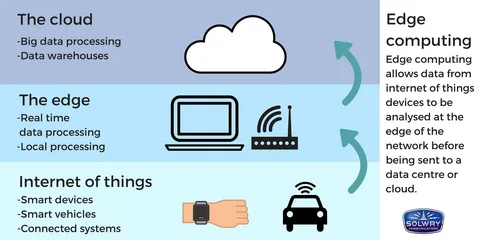Forge Computing vs Edge Computing | Future of Cloud & Mobile Edge Computing in UK
The world of computing is evolving at an unprecedented pace, and the UK is at the forefront of adopting innovative technologies. Among the latest trends, Forge Computing and Edge Computing are gaining significant attention. These concepts are often compared to Cloud Computing and Mobile Edge Computing, creating a buzz in the tech community. But what do these terms mean, and how do they differ? Let’s dive into the details and explore how these technologies are shaping the future of computing in the UK.
What is Forge Computing?
Forge Computing is a relatively new concept that focuses on creating highly customized and efficient computing environments tailored to specific tasks or industries. Unlike traditional computing models, Forge Computing emphasizes flexibility, scalability, and real-time processing. It is designed to handle complex workloads by integrating advanced technologies like artificial intelligence (AI), machine learning (ML), and the Internet of Things (IoT).
In the UK, Forge Computing is gaining traction in sectors such as healthcare, finance, and manufacturing. For example, in healthcare, it enables real-time analysis of patient data, improving diagnostics and treatment plans. In manufacturing, it optimizes production processes by analyzing data from connected devices on the factory floor.
What is Edge Computing?
Edge Computing, on the other hand, is a well-established paradigm that brings computation and data storage closer to the source of data generation. Instead of sending data to a centralized cloud server, Edge Computing processes it locally, reducing latency and bandwidth usage. This is particularly useful for applications that require real-time responses, such as autonomous vehicles, smart cities, and industrial automation.
In the UK, Edge Computing is being widely adopted in urban areas to support smart city initiatives. For instance, traffic management systems use Edge Computing to analyze data from sensors and cameras in real-time, reducing congestion and improving road safety.
Forge Computing vs Edge Computing | Key Differences
While both Forge Computing and Edge Computing aim to improve efficiency and performance, they differ in their approach and application.
- Focus Area:
- Forge Computing is task-specific and focuses on creating customized solutions for particular industries or use cases.
- Edge Computing is location-specific and focuses on processing data closer to its source.
- Technology Integration:
- Forge Computing integrates advanced technologies like AI and ML to deliver tailored solutions.
- Edge Computing relies on distributed computing infrastructure to reduce latency and improve speed.
- Scalability:
- Forge Computing is highly scalable but requires significant customization for each use case.
- Edge Computing is inherently scalable, as it can be deployed across multiple locations with minimal changes.
- Use Cases:
- Forge Computing is ideal for industries that require specialized solutions, such as healthcare and finance.
- Edge Computing is best suited for applications that need real-time processing, such as autonomous vehicles and smart cities.
Cloud Computing vs Edge Computing: A Comparative Analysis
Cloud Computing has been the backbone of digital transformation for over a decade. It offers centralized data storage and processing, enabling businesses to access resources on-demand. However, as the volume of data grows, Cloud Computing faces challenges related to latency, bandwidth, and cost.
Edge Computing addresses these challenges by decentralizing data processing. Instead of relying on a central cloud server, Edge Computing distributes the workload across multiple devices, reducing the need for constant data transmission. This not only improves performance but also enhances data security and privacy.
In the UK, businesses are increasingly adopting a hybrid approach, combining the strengths of Cloud and Edge Computing. For example, retail companies use Cloud Computing for inventory management and Edge Computing for in-store customer analytics.
The Rise of Mobile Edge Computing in the UK
Mobile Edge Computing (MEC) is a subset of Edge Computing that focuses on bringing computation closer to mobile users. It leverages 5G networks to deliver ultra-low latency and high bandwidth, enabling new applications and services.
In the UK, MEC is transforming industries such as gaming, entertainment, and healthcare. For instance, cloud gaming platforms use MEC to deliver high-quality gaming experiences on mobile devices. Similarly, healthcare providers are using MEC to enable remote surgeries and real-time patient monitoring.
The rollout of 5G networks in the UK is accelerating the adoption of MEC. With faster speeds and lower latency, 5G enables seamless connectivity between devices, paving the way for innovative applications.
Challenges and Opportunities
While Forge Computing, Edge Computing, and Mobile Edge Computing offer numerous benefits, they also come with challenges.
- Infrastructure Costs:
- Deploying Forge and Edge Computing solutions requires significant investment in infrastructure and technology.
- Data Security:
- Decentralized computing models increase the risk of data breaches and cyberattacks.
- Skill Gap:
- The adoption of these technologies requires skilled professionals, creating a demand for specialized training programs.
Despite these challenges, the opportunities are immense. By leveraging these technologies, businesses in the UK can improve efficiency, reduce costs, and deliver better services to their customers.
The Future of Computing in the UK
The UK is poised to become a global leader in Forge Computing, Edge Computing, and Mobile Edge Computing. With a strong focus on innovation and digital transformation, the country is investing heavily in research and development.
Government initiatives such as the UK Digital Strategy and the National Data Strategy are driving the adoption of these technologies. Additionally, partnerships between tech companies, universities, and research institutions are fostering innovation and creating new opportunities.
As these technologies continue to evolve, they will play a crucial role in shaping the future of computing in the UK. From smart cities to personalized healthcare, the possibilities are endless.
Conclusion
Forge Computing and Edge Computing are revolutionizing the way we process and analyze data. While Forge Computing offers customized solutions for specific industries, Edge Computing brings computation closer to the source, reducing latency and improving performance. When combined with Cloud Computing and Mobile Edge Computing, these technologies enable businesses to unlock new opportunities and stay ahead of the competition.
In the UK, the adoption of these technologies is transforming industries and driving innovation. As we move towards a more connected and data-driven future, Forge Computing, Edge Computing, and Mobile Edge Computing will continue to play a pivotal role in shaping the digital landscape.
By understanding the differences and applications of these technologies, businesses can make informed decisions and harness their full potential. The future of computing is here, and the UK is leading the way.




Post Comment